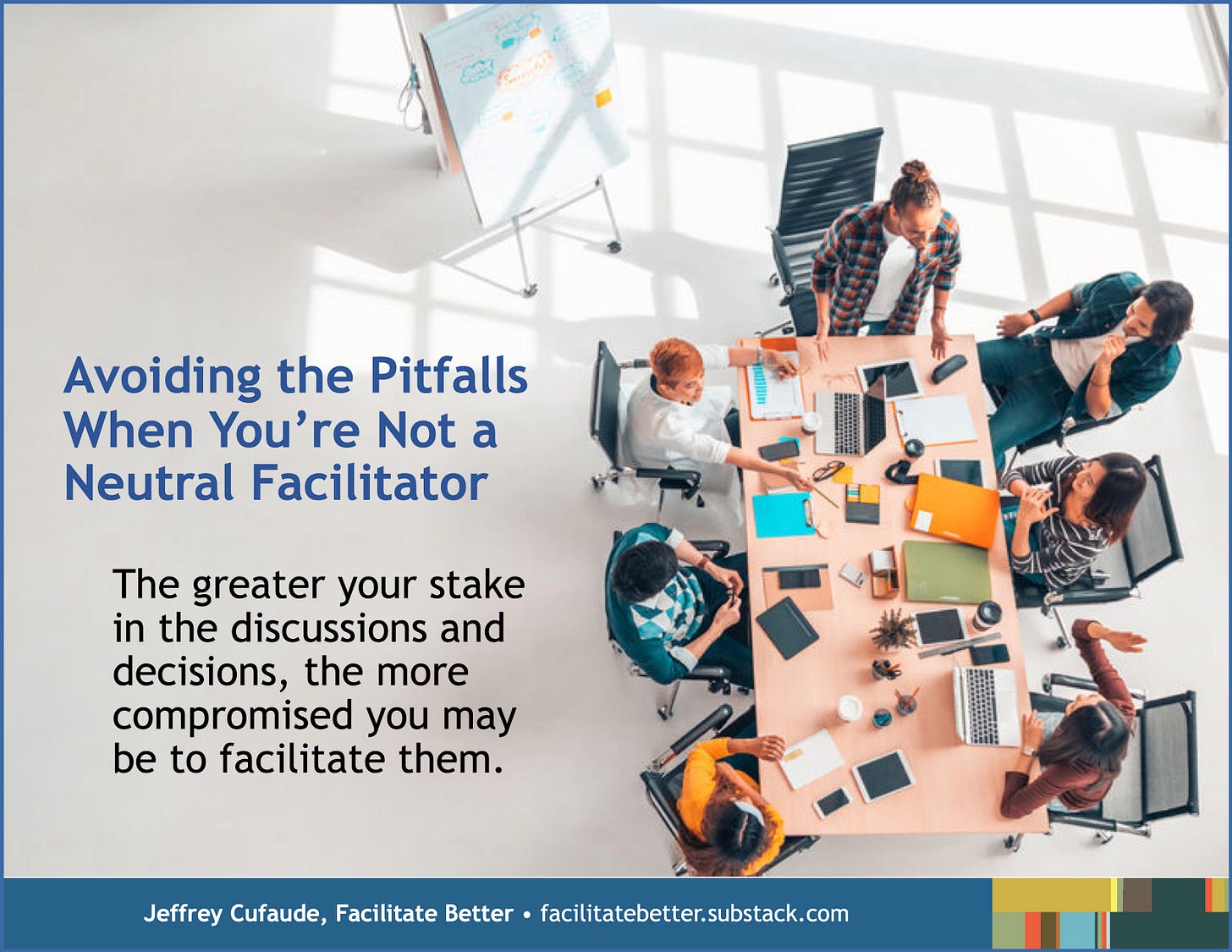Avoiding the Pitfalls When You're Not a Neutral Facilitator (Facilitation Friday #4)
It's hard to effectively facilitate conversations when you want to actively influence them.
Ever thought about how many people providing facilitation may be compromised at times to do so?
Effective facilitation should make it easier for better discussions, decisions, and results. Doing so can be difficult if the facilitator has a vested interest in specific positions or outcomes or holds positional power or authority over any participants.
Successful meeting management
It’s called many things: leading, running, chairing, facilitating … this is more than semantics even though people may use those terms interchangeably. Each word connotes a different relationship dynamic with meeting participants.
Effective facilitation involves neutrally managing conversations, not subjectively contributing to their content. When I am brought in to facilitate a group, I have a stake in ensuring the group reaches a decision that they appropriately support, but not any specific decision. Whether or not it is the right decision is the group’s purview.
But when team leaders, department managers, or board or committee chairs lead meetings, they often want to influence what decision is made. Rather than just manage the process, they sometimes become active participants in the conversation and advocate for particular beliefs, choices, or opinions. Can they effectively facilitate when they aren’t really neutral?
Truthfully? No. Like a judge in a case where she knows the defendant well, the facilitator seeking to influence a conversation’s content or actual decision may be compromised or have a clear conflict of interest.
Ideally, individuals would recuse themselves from the facilitator role if they cannot honor the neutrality it requires. Of course, that rarely happens when the facilitator role and an individual’s leadership position are considered inextricably intertwined.
I know how unlikely or impractical recusal may sound. But it is an option worth considering, particularly when others’ full ownership of a decision is critical or people are less likely to speak freely because of what they perceive as biased facilitation.
Options other than recusal
Remember, anyone can—and everyone should—make facilitative contributions. A meeting’s success is a shared responsibility in which everyone has a role.
If you are concerned about providing neutral facilitation, explore with participants the potential awkward reality of your position. Elicit others’ ideas about what you (and they) can do to ensure they contribute freely, challenge your opinions (and possibly, your facilitation), and own both the process and outcomes.
Additional options to reduce the potential negative ramifications of a less than neutral perspective and position include:
Collect input anonymously and aggregate responses. This ensures that your ideas initially carry no more weight than anyone else’s.
Have the group develop shared criteria for evaluating ideas. This reduces the likelihood that personality, politics, or power—including yours—exert undue influence.
Keep your opinions in reserve. When positional leaders who are facilitating express their opinions early on, they may discourage others from offering contrary perspectives. If you must share your viewpoint, do it after others have expressed theirs.
Be aware of your nonverbal cues. Participants often examine leaders’ body language to assess how they feel about a discussion. Try to maintain neutral facial expressions and remain aware of your body language.
Be restrained in how you redirect discussion. Imagine others are excited about an idea you don’t favor. Instead of rejecting it, invite further examination—for example, “Let’s consider how this idea could help achieve the priorities in our strategic plan.” This is a less biased response than expressing your distaste for the idea. Subsequent discussion also may cause you or the group to reconsider initial reactions to it.
Acknowledge your potential bias. Facilitation that drives a group toward your preferred position can cause participants to feel manipulated and resentful. When appropriate, acknowledge your conflict upfront. For example, say, “I want us to reach a decision that everyone supports. It’s probably no surprise that I have some opinions about what that decision should be. But I remain open to others making a case for their preferred options. Please challenge my facilitation if you feel it biases our discussion.”
Rotate facilitation responsibility. Although it’s customary, the board chair, company CEO, or department manager doesn’t have to facilitate all meetings. Rotating this responsibility among group members builds others’ capacity to manage meetings and allows you to engage more fully in the conversation.
Bottom line?
The greater your stake in—or desire to influence—the content or outcomes of conversations, the more compromised you may be to facilitate them. Proactively manage this reality and make it easier for better discussions, decisions, and results to occur.
Getting in Action
Consider when your facilitation role may be compromised. Determine how to work around this using one of the approaches suggested here or other ideas you might have.
Identify meetings where it might be especially desirable to rotate the facilitation responsibility. Initiate a discussion with relevant stakeholders about why and how this should occur. Determine how to train and support individuals who will facilitate.
Think of a gathering where the current facilitator too often involved is in content discussions instead of managing the process and remaining neutral. Consider how to discuss this issue with the individual and support desired changes in their approach.
© Facilitate Better and Jeffrey Cufaude. All rights reserved.
Note: A version of this essay entitled “Focus on Fairness” appeared in the 2023 Board Brief publication from the American Society of Association Executives.
To affordably license this content for reprint on your site or in electronic or print communications or to contact me regarding customized facilitation skills workshops or consultations, complete this form.




